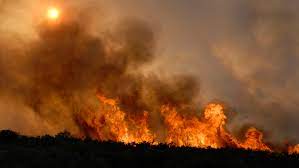The summer of 2023 has seen the United States affected by wildfires inside and outside of its borders. In June and July, smoke from Canadian wildfires caused dangerous air-quality conditions for millions of Americans. In August, wildfires in Maui devastated the Hawaiian island, destroying thousands of structures and claiming an untold number of lives.
According to the National Interagency Fire Center, there are 75 wildfires burning across the United States as of August 24. While these fires are dangerous for everyone, the American Heart Association (AHA) warns that survivors of heart attacks and strokes are especially vulnerable.
According to Dr. Celina Yong, an interventional cardiologist at the VA and an associate professor of medicine at Stanford University, smoke can exacerbate existing cardiovascular conditions. What’s more, according to an article published in the AHA journal Circulation, even short-term exposure can cause cardiovascular-related death.
Heart disease in particular has been found to be prevalent following exposure to dense smoke. An article in the Journal of the American Heart Association found that, following periods of heavy smoke, ER visits for heart attacks and ischemic heart disease rose by 42 percent and 22 percent, respectively. Heavy smoke may also increase the risk of experiencing out-of-hospital cardiac arrest by as much as 70 percent.
Fortunately, when threatened by wildfire smoke, people can take steps to protect their cardiovascular health. Dr. Yong recommends keeping your windows closed and using a high-quality air filter when indoors. Before going outside, she recommends checking AirNow.gov, a service of the Environmental Protection Agency that reports on local air-quality conditions. If a person needs to leave their home, an N95 or other high-quality mask can offer some protection.
The AHA notes that wildfire smoke can cause cardiovascular damage even in healthy people, meaning that everyone should take precautions. Knowing the symptoms of a heart attack or stroke is also important, and people who see these signs in themselves or others should not hesitate to call 911.
Disclaimer: This website contains general information about medical conditions and treatments. This information is not intended or implied to be a substitute for professional medical advice. No guarantee is given regarding the accuracy or validity of any statements or information provided on this website. Do not rely on this information as an alternative to medical advice from your doctor or other professional healthcare provider. You should seek immediate medical attention if you think you are suffering from a medical condition. You should never delay seeking medical advice, disregard medical advice, or discontinue medical treatment because of information on this website.

